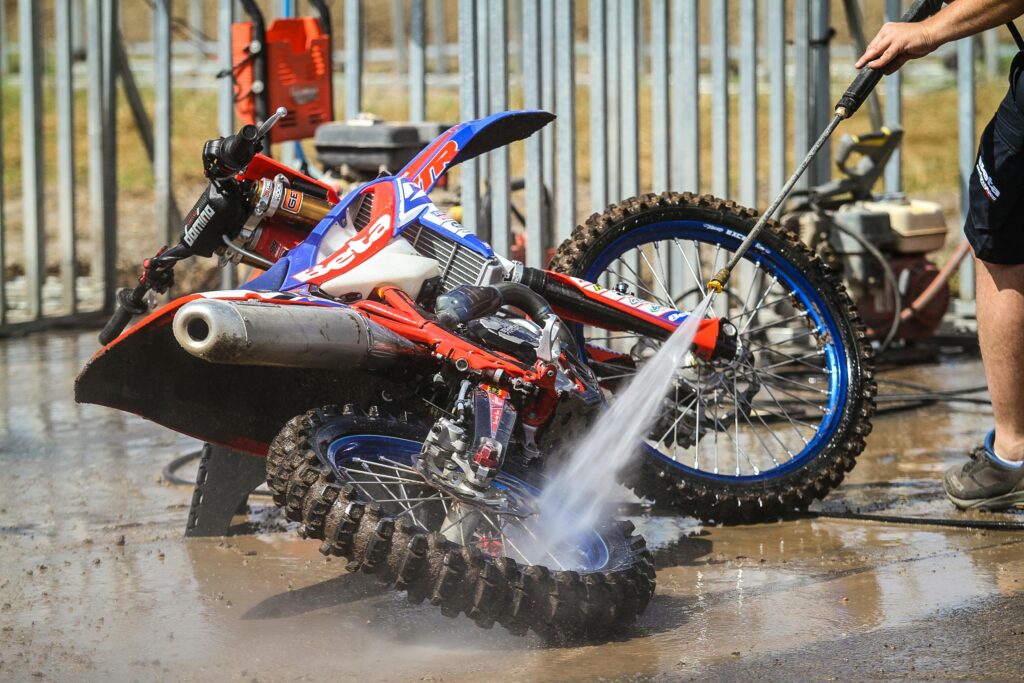Keeping farm equipment clean isn’t just about appearances, it’s about protecting your investment and ensuring optimal performance. Whether you’re dealing with mud-caked tractors after winter work or salt-crusted implements from coastal properties, the right pressure washer becomes an essential tool in your farm maintenance arsenal.
For small acreage farmers and rural property owners, choosing between electric and petrol pressure washers involves balancing power, portability, and running costs. We’ve compared 12 pressure washers specifically for farm equipment cleaning, focusing on models under $800 that deliver real-world performance in Australian conditions.

Why Agricultural Equipment Needs Cleaning with a Pressure Washer
Farm machinery operates in harsh conditions; dust, mud, crop residue, and moisture create the perfect storm for corrosion and mechanical wear. Regular pressure washing removes abrasive particles that accelerate component wear, prevents salt buildup in coastal areas, and allows for proper inspection of critical parts.
The challenge lies in finding equipment powerful enough to shift stubborn agricultural grime whilst remaining practical for regular use on rural properties where power sources may be limited and portability matters.
Electric vs Petrol Farm Pressure Washers: The Core Differences
Electric Pressure Washers offer consistent power delivery, quieter operation, and lower running costs. They’re ideal for properties with reliable mains power and suit farmers who prefer straightforward, low-maintenance equipment.
Petrol Pressure Washers provide superior mobility and typically higher pressure output. They excel in remote locations, offer greater water flow rates, and handle the heaviest cleaning tasks without power cord limitations.
Comprehensive Farm Pressure Washer Comparison Table
| Model | Type | Pressure (PSI) | Flow Rate (L/hr) | Engine/Motor | Weight (kg) | Best For |
| Karcher K5 Premium Smart Control | Electric | 2000 | 500 | 2100W Motor | 18.5 | Tech-savvy farmers |
| Gerni Super 140.3-8 P X-TRA | Electric | 2030 | 460 | 2800W Motor | 22 | Heavy-duty regular use |
| Jetwave Corsair 21-200 | Petrol | 2900 | 720 | Honda GX160 | 65 | Maximum cleaning power |
| Crommelins Subaru 2700 PSI | Petrol | 2700 | 650 | Subaru EX17 | 58 | Daily commercial use |
| Bosch AdvancedAquatak 150 | Electric | 2180 | 480 | 2200W Motor | 16.8 | Space-conscious farmers |
| Jetstream 2200 PSI Petrol | Petrol | 2200 | 500 | OHV 6.5HP | 45 | Portable power |
| CAT 2200 PSI Petrol | Petrol | 2200 | 520 | CAT Engine | 48 | Brand reliability |
| Ryobi 2300W Electric | Electric | 2030 | 420 | 2300W Motor | 19.2 | Tool integration |
| Powercraft 2500 PSI | Petrol | 2500 | 580 | 7HP OHV | 52 | Budget petrol option |
| Stanley SHP2150 | Electric | 2150 | 440 | 2150W Motor | 20.5 | Mid-range reliability |
| Hyundai HYW2000P2 | Petrol | 2000 | 480 | Hyundai IC200 | 38 | Compact petrol |
| Parkside PHD 135 | Electric | 1958 | 390 | 1900W Motor | 15.8 | Budget electric |
Our Top 12 Farm & Agriculture Pressure Washer Comparisons
Electric Pressure Washers
1. Karcher K5 Premium Smart Control
- Pressure: 2000 PSI
- Flow Rate: 500 L/hr
- Key Features: App connectivity, adjustable pressure, premium accessories
- Best For: Tech-savvy farmers wanting precise control
2. Gerni Super 140.3-8 P X-TRA
- Pressure: 2030 PSI
- Flow Rate: 460 L/hr
- Key Features: Professional-grade components, excellent durability
- Best For: Heavy-duty regular use on multiple implements
3. Bosch AdvancedAquatak 150
- Pressure: 2180 PSI
- Flow Rate: 480 L/hr
- Key Features: 3-in-1 nozzle, compact storage, self-priming
- Best For: Space-conscious farmers with mixed cleaning needs
4. Ryobi 2300W Electric Pressure Washer
- Pressure: 2030 PSI
- Flow Rate: 420 L/hr
- Key Features: One+ battery compatibility option, versatile attachments
- Best For: Existing Ryobi tool users seeking integration
5. Parkside High Pressure Cleaner PHD 135
- Pressure: 1958 PSI
- Flow Rate: 390 L/hr
- Key Features: Budget-friendly, decent build quality, basic accessories
- Best For: Occasional use on smaller equipment
6. Stanley SHP2150
- Pressure: 2150 PSI
- Flow Rate: 440 L/hr
- Key Features: Soap tank, multiple nozzles, solid warranty
- Best For: Farmers wanting reliable mid-range performance
Petrol Pressure Washers
7. Jetwave Corsair 21-200
- Pressure: 2900 PSI
- Flow Rate: 720 L/hr
- Key Features: Commercial-grade pump, Honda engine, professional build
- Best For: Serious farm operations requiring maximum cleaning power
8. Crommelins Subaru 2700 PSI
- Pressure: 2700 PSI
- Flow Rate: 650 L/hr
- Key Features: Subaru engine reliability, steel frame, quality components
- Best For: Daily use on large implements and multiple machines
9. Jetstream 2200 PSI Petrol
- Pressure: 2200 PSI
- Flow Rate: 500 L/hr
- Key Features: Lightweight design, easy start system, decent warranty
- Best For: Farmers needing portability with reasonable power
10. Powercraft 2500 PSI
- Pressure: 2500 PSI
- Flow Rate: 580 L/hr
- Key Features: Value pricing, adequate performance, basic accessories
- Best For: Budget-conscious farmers with moderate cleaning needs
11. Hyundai HYW2000P2
- Pressure: 2000 PSI
- Flow Rate: 480 L/hr
- Key Features: Compact petrol design, affordable running costs
- Best For: Small farm operations wanting petrol convenience
12. CAT 2200 PSI Petrol Pressure Washer
- Pressure: 2200 PSI
- Flow Rate: 520 L/hr
- Key Features: CAT reliability, solid construction, good support network
- Best For: Farmers prioritising brand reliability and service support
Performance Analysis for Pressure Cleaning Agricultural Equipment
Heavy Machinery Cleaning
For tractors, harvesters, and large implements, petrol models with 2500+ PSI and high flow rates excel. The Jetwave Corsair and Crommelins Subaru deliver superior performance for removing packed mud and crop residue.
Regular Maintenance Washing
Electric models like the Karcher K5 and Gerni Super provide excellent results for routine cleaning without the noise and exhaust fumes of petrol units.
Portability Requirements
When cleaning equipment in paddocks or remote locations, petrol models offer unmatched flexibility. The Jetstream 2200 PSI provides good mobility without excessive weight.
Running Costs
Electric models typically cost 60-70% less to operate per hour, making them economical for frequent use near power sources.
Choosing the Right Model for Your Farm
For Large Operations (50+ acres): Invest in petrol models with 2500+ PSI for maximum versatility and power.
For Hobby Farms (Under 20 acres): Electric models offer sufficient power with lower running costs and easier maintenance.
For Mixed Use: Consider the Karcher K5 for excellent all-round performance or the Jetstream 2200 PSI for petrol versatility.
For Budget-Conscious Farmers: The Parkside PHD 135 (electric) or Powercraft 2500 PSI (petrol) provide solid value without premium pricing.
Essential Accessories for Farm Use
Invest in rotary surface cleaners for efficient cleaning of large flat surfaces, foam lances for pre-treatment of stubborn grime, and extension wands to reach elevated areas safely. Quality quick-connect fittings reduce setup time and improve reliability.
Maintenance Tips for Longevity
Regular maintenance extends pressure washer life significantly. Use manufacturer-recommended oils, store units properly during off-seasons, and flush systems with clean water after use. Annual servicing prevents costly repairs and maintains optimal performance.
The Verdict
For most small acreage farms, the Karcher K5 Premium Smart Control offers the best balance of power, features, and reliability in the electric category. Its smart pressure adjustment and quality construction justify the investment for regular farm equipment cleaning.
In the petrol category, the Crommelins Subaru 2700 PSI delivers professional-grade performance with proven reliability. While approaching the upper price limit, its superior build quality and power output make it ideal for serious farm operations.
Budget-conscious farmers will find excellent value in the Stanley SHP2150 for electric needs or the Jetstream 2200 PSIfor petrol portability.
Australian Climate Considerations
Australia’s diverse climate zones present unique challenges for pressure washer selection. In tropical northern regions, high humidity can affect electric components, making sealed units preferable. Coastal properties require corrosion-resistant fittings due to salt exposure, whilst inland areas with extreme temperature variations need robust construction.
During bushfire season, many rural properties operate on generator power, making petrol units more practical. Winter operations in southern regions may require freeze-protection measures for water systems.
Troubleshooting Common Issues
Low Pressure Output: Check for clogged nozzles, worn seals, or inadequate water supply. Most pressure loss stems from blocked jets rather than pump problems.
Engine Won’t Start: Ensure fresh fuel, clean air filter, and proper oil levels. Ethanol-blended fuels can cause starting issues after extended storage.
Water Leaks: Replace worn O-rings and check hose connections. High-pressure systems require regular seal maintenance.
Overheating: Inadequate water flow or blocked cooling fins cause overheating. Never run units without water flow.
Safety Considerations for Farm Use
High-pressure water can inject contaminants through skin, causing serious injury. Always wear safety glasses and closed footwear when operating pressure washers. Never point the spray at people, animals, or electrical equipment.
Maintain safe distances from painted surfaces—close contact can remove paint or cause surface damage. When cleaning near livestock, ensure animals are secured away from the work area.
Regional Supplier Network
Australian farmers benefit from extensive dealer networks for major brands. Karcher and Gerni maintain service centres in most regional centres, whilst imported brands may require freight to capital cities for warranty service.
Consider local parts availability when selecting models; common consumables like nozzles, hoses, and seals should be readily available through rural suppliers.
Frequently Asked Questions
A: Only units specifically designed for hot water should be used with heated supply. Cold water units can be damaged by temperatures above 40°C.
A: Annual servicing for regular farm use, including oil changes, pump inspection, and seal replacement as needed.
A: Most units require 15-20 litres per minute minimum flow. Inadequate supply causes pump damage and poor performance.
A: Yes, but install inline filters to prevent debris damage. Tank water often contains sediment that can clog nozzles.
Remember, the best pressure washer for your farm depends on your specific cleaning needs, power availability, and budget constraints. Choose based on your primary use case rather than maximum specifications; consistent performance matters more than peak numbers for long-term satisfaction.
Proper equipment maintenance starts with proper cleaning equipment. Invest wisely in a quality pressure washer, and your farm machinery will reward you with longer life and better performance season after season.
Note: As an Amazon Associate, Grainshed earns from qualifying purchases. This comprehensive guide provides analysis to help Australian property owners. Prices are relevant to the time of writing and may differ.


